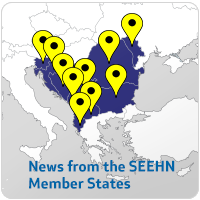“Global solidarity, shared responsibility”.

SEEHN joins the global campaign dedicated to raising awareness related to HIV/AIDS on the World AIDS Day 2020.
Every year, on 1 December, the world commemorates World AIDS Day. People around the world unite to show support for people living with and affected by HIV and to remember those who lost their lives to AIDS.
In 2020, the world’s attention has been focused by the COVID-19 pandemic on health and how pandemics affect lives and livelihoods. COVID-19 is showing once again how health is interlinked with other critical issues, such as reducing inequality, human rights, gender equality, social protection and economic growth. With this in mind, this year the theme of World AIDS Day is “Global solidarity, shared responsibility”.
The COVID-19 pandemic has revealed the entrenched inequalities existing in our societies. This health crisis, like many others, is hitting the poorest and the most vulnerable the hardest.
Across the WHO European Region, the number of people living with undiagnosed HIV is increasing. More than 136 000 people were newly diagnosed in 2019, according to data published today by ECDC and WHO/Europe. “Roughly 20% of these diagnoses were in the European Union (EU)/European Economic Area (EEA) and 80% were in the eastern part of the WHO European Region.
The HIV diagnosis (53%) occurs at a late stage of the infection when the immune system has already started to fail. This is a sign that testing strategies in the Region are not working properly to diagnose HIV early.
WHO/Europe and ECDC emphasize that to reduce the number of future HIV infections, Europe needs to focus on 3 main areas:
- prioritizing a range of prevention measures such as awareness-raising, the promotion of safer sex and condom use, the provision of needle exchange programmes and opioid substitution therapy, and pre-exposure prophylaxis for HIV (also known as PrEP);
- providing efficient HIV counselling and testing services including rapid diagnostic services, community-based HIV testing and HIV self-testing; and
- ensuring rapid access to quality treatment and care for those diagnosed.”
HIV infection has no cure yet. Though, antiretroviral (ARV) drugs can control the virus and help prevent transmission so that people with HIV, and those at substantial risk, can enjoy healthy, long and productive lives.
References:
https://www.who.int/campaigns/world-aids-day/2020/campaign-materials
https://www.who.int/campaigns/world-aids-day/2020/key-messages
https://www.who.int/news-room/fact-sheets/detail/hiv-aids







